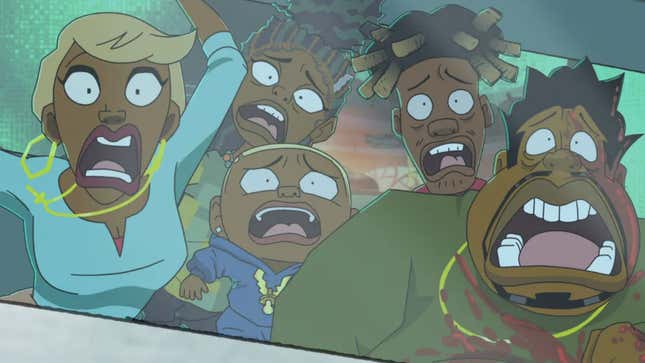
To understand why Netflix’s new “Good Times: Black Again” is a cataclysmic shit show of a “reboot” is to first examine the original “Good Times” sitcom.
Running from 1974 to 1979 as a spinoff of “Maude” and “All in the Family” and in syndication ever since, the show explored the Evanses, a poor Black family living in the Chicago projects. The show succeeded in mining humor from poverty while not defining the family by it and served as a predecessor to “The Cosby Show” by being the first sitcom to depict a two-parent Black household.
Still, star James Amos became unsettled by how the show’s writers minimized the academic ambitions of the two younger Evans children – Thelma (BernNadette Stanis) and Michael (Ralph Carter) – for the more minstrelsy affectations of eldest child J.J. (Jimmie Carter).
“I felt that there was too much emphasis being put on J.J. and his chicken hat saying ‘Dynomite!’ every third page, when just as much emphasis and mileage could have been gotten out of my other two children and the concomitant jokes and humor that could have come out of that,” Amos said in a 2015 interview.
Amos voiced his gripes to the Powers That Be, so (white) executive producer Norman Lear and company killed him off after season 3 in 1976.
Here’s hoping the 84-year-old Amos never watches “Black Again,” which takes the worst elements of J.J. and feeds it the Hulk serum. The show, which released April 12, is a nigh redemption-free, abhorrent pastiche of every Black stereotype you’ve ever seen in the most tragic of Black sitcoms and sketch comedy. It makes “Homeboys From Outer Space” look like “The Wire.”
The problems with the show are manifold and you’d be here all damn afternoon if I listed them all here. (As Bassey Ikpi pointed out, even the animation is lazy.) Perhaps the most egregious example is the youngest Evans family member: Dalvin, a drug dealing baby with a grown man voice (Gerald “Slink” Johnson) who is kicked out of the house by his father and evokes the adultification of Black youth that often has tragic results.
“Black Again” is executive produced by Lear (who died in December at 101), “Family Guy” creator Seth McFarlane – who has proven with “The Cleveland Show” that he enjoys Black folks shucking and jiving — and NBA superstar Stephen Curry, whose presence is a head scratcher: a dude who has been rich his entire life thanks to an NBA player pops and a nonpareil jump shot doesn’t inspire confidence as a creative thumb on a story about a struggling Black family from the hood.
Lear, McFarlane and Curry apparently brought the concept to Ranada Shepard, an Afro-Latina woman who said that she wanted to approach the show with authenticity, but “Black Again” feels like Candace Owens’ version of Black “authenticity.” Early co-creator Carl Jones -- who produced the far superior “The Boondocks” cartoon -- probably dipped early because he saw it was a flaming bus headed into a steel wall.
I’m disinclined to lay blame at the show’s legitimate Black talent (Jay Pharoah, Marsai Martin, Yvette Nicole Brown, Wanda Sykes). I reserve that for the writers’ room, which appears to have had the edict of tossing as much stereotypically offensive “Black” shit as they could muster onto a whiteboard to see what sticks. A blindly religious mother? Check! A toddler snorting baby powder? Hilarious! A gunfight while trying to obtain black market ADHD meds? Gold!
“Black Again” had to be created by white people for white people, because no discerning Black person with any shred of self-respect will appreciate this show. No doubt Netflix heard the deafening din of disapproval following the March trailer release, but they already had 10 episodes in the can, so they had to let it rock, I guess.
If you’re feeling masochistic, give “Good Times: Black Again” a shot. But if hearing J.B. Smoove make a mockery out of Florida Evans’ famous “Damn, Damn, Damn!” at the end of the first episode doesn’t make you want to turn it off and throw your Roku remote out the window, you’re better than me.